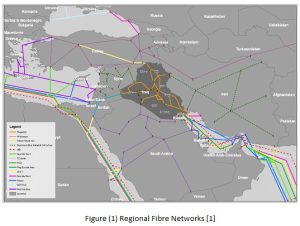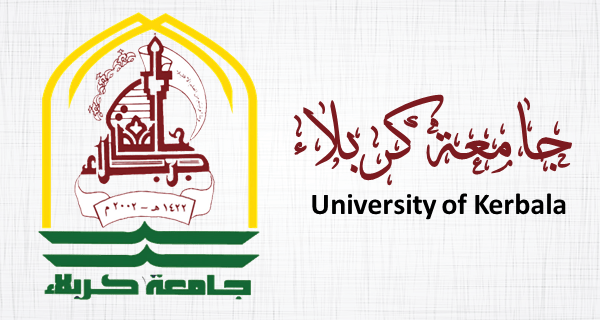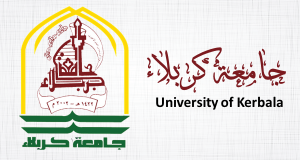Assist. Prof. Dr. Ruaa Abdulridha Saeed Alsabah
Assist. Prof. Dr. Ashwan A. Abdulmunem
Computer Science and Information Technology
In today’s interconnected world, an easy and fast flow of data is essential to economic growth and technological advancement, and global connectivity is a critical aspect of data transmission. Among the communication data traffic, which refers to the transfer of data between different networks or countries, among the many locations that facilitate this flow, Iraq stands out as a strategically important country located between the Gulf countries and Europe, as shown in figure (1). The aim of this article is an introduction to a detailed research exploration of Iraq’s role in facilitating communications data traffic and the importance it holds for regional and global communications.

Telecom data traffic: a vital component of global connectivity.
Communication data traffic plays an essential role in the functioning of the modern digital system and involves routing data traffic across different communication networks to reach its intended destination. This data can include a wide range of information, including internet traffic, voice calls, video transmission, and commercial communications. . As the volume of data transmitted globally continues to increase exponentially, efficient and reliable transmission methods are of paramount importance [1].
The role of Iraq: a strategic link between the Gulf states and Europe.
Iraq, located in the heart of the Middle East, is considered as a unique geographical advantage that makes it an important transit center for communications data traffic, as Iraq is located between the Gulf countries and Europe, and its strategic location of Iraq allows for the effective transmission of data between these two main regions [2].
Advantages of Iraq’s geographical position
The strategic location of Iraq between the Gulf States and Europe provides several major advantages:
⦁ Lower Latency Better: The shorter the data distance, the lower the latency and the higher the connection speed. Iraq’s location as a transit hub allows for reducing data latency between the Gulf countries and Europe, ensuring fast communication and enhancing user experience.
⦁ Enhancing alternative protection corridors: The strategic location of Iraq provides flexibility in data transmission routes in the event of outages (interruptions in one path). Alternative paths can be used across Iraq to maintain uninterrupted communication.
⦁ Economic Opportunities: Iraq’s role as a telecom data transmission hub can bring significant economic benefits, and the establishment of data centers, connectivity points, and telecom infrastructure in the country can attract investment, create job opportunities, and boost the local economy [3].
As Iraq plays a critical role in facilitating Transit communications data traffic, it becomes necessary to study the approach of how to ensure the rapid and easy operation of the country’s telecommunications infrastructure and to study the proactive measures and initiatives taken by it.
⦁ Develop the infrastructure:
Robust infrastructure to support is one of the most important roles in supporting transit data traffic. And to undertake initiatives to improve and expand the country’s communications network infrastructure, including the development of fiber optic networks, DWDM messaging systems and data centers through investment in the backbone infrastructure network, with the aim of enhancing connectivity, reducing RTD latency and ensuring the direct flow of data across Iraq.
⦁ Partnerships between the public and private sectors:
To accelerate infrastructure development and benefit from private sector expertise, we should actively promote PPPs (private-public partnerships) in the telecom sector through collaborations with private companies, where additional resources and knowledge can be leveraged. Transit will support technical and investment data traffic growth. Public-private partnerships can bring innovation, efficiency and best practices to the sector, contributing to the overall development of Iraq’s communications infrastructure.
⦁ International cooperation:
This cooperation includes working with regional and international organizations, such as the International Telecommunication Union (ITU) and neighbouring countries, to accommodate regulations and laws, exchange best practices, and enhance cross-border connectivity as these efforts aim to enhance Iraq’s position as a reliable and efficient transit hub while enhancing stability and cooperation in the region.
⦁ Ensuring security and stability:
To protect communications data traffic in Iraq, security and stability are essential. This includes working closely with relevant government agencies, law enforcement and security forces to protect critical infrastructure, prevent cyber threats and address any potential risks to the safety of data transmission by ensuring a secure environment. It is important to build trust and enhance Iraq’s reputation as a stable and reliable transit route [2][3].
The importance of the transit movement in the stability of Iraq and its international importance
In addition to the economic benefits associated with serving as a hub for communications data transmission, Iraq’s strategic location as a main route for over-the-air (OTT) traffic (from global technology giants such as Google, Facebook, Microsoft, etc.) to the Gulf countries is of great importance in terms of repercussions on Iraq’s stability and international standing. This is because the role of Iraq in facilitating transit traffic not only brings economic advantages but also raises its political importance to increasing stability and global recognition.
In addition, the importance of transferring communications data across Iraq goes beyond political considerations and stability because the establishment of a strong infrastructure for economic diversification through communications, data centres, and regional and international linkage points within the country creates opportunities to achieve investments with different companies that are looking for reliable ways to transfer data, as it can Iraq can take advantage of its strategic location to promote technological innovation, create job opportunities, and stimulate economic growth in the telecommunications sector and related sectors [4][5].
References
⦁ Kassim Al-Hassani, ICT Basra 2017 “Iraq Telecoms: Basra The Smart Transit Hub Connecting the Region and the World ”, 27th-28th March 2017, Basra, Iraq.
⦁ Kassim Al-Hassani, Iraq Telecom Conference 2013 “Assessing Physical Infrastructure Requirements; Pioneering Partnership Models”, Istanbul, Turkey
⦁ Kassim Al-Hassani, Telecoms World Iraq Conference “Positioning Iraq as a Transit Hub For International Traffic Through Fibre Investment”, Dubai, UAE, October 2011
⦁ Alsabah, Ruaa, et al. “An insight into internet sector in Iraq.” International Journal of Electrical & Computer Engineering (2088-8708) 11.6 (2021).
⦁ Douzet, Frédérick, et al. “Digital routes and borders in the Middle East: the geopolitical underpinnings of Internet connectivity.” Territory, Politics, Governance (2022): 1-22.





























































